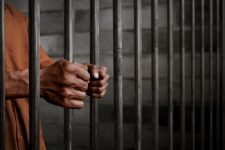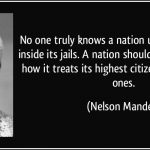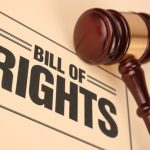Should Prisoners Be Allowed to Vote?

It is often said that people are sent to prison as punishment, not to be punished. In other words, the loss of liberty is the price of committing crime, and inmates should not been unjustifiably denied other basic civil rights.
However, the view that those sent to prison should lose not only their freedom, but other basic civil liberties as well, is prevalent in Australia.
That concept has its origins in ancient Greece, where incarcerated individuals became the civil dead: those who forewent entitlements, such as property and voting rights.
But in the twentieth century, rights advocates began arguing that inmates bring their civil rights into prison with them. This modern concept is set out within international agreements, such as the United Nations Nelson Mandela Rules and the European Convention on Human Rights.
In Australia, the question of whether prisoners should be allowed to vote is controversial. At present, serious offenders are barred from voting. And as late as 2006, the Howard government passed legislation that withdrew all inmates’ right to vote, although, these laws didn’t stick.
Prisoner rights advocates argue that in a society like Australia, where the focus of the prison system should be on inmate rehabilitation and reintegration, disenfranchising offenders does little to encourage their full participation in civil society on release.
What are the laws regarding prisoners and voting?
Currently, an inmate can vote in a federal election if they’re serving a prison sentence of less than three years. This criterion was established via 2004 amendments to the Commonwealth Electoral Act 1918. Prior to this the cut-off was five years.
The Howard government subsequently passed a 2006 amendment bill that revoked the right to vote for all prisoners. But, in 2007, the High Court of Australia ruled in Roach v the Electoral Commissioner that these laws were unconstitutional.
The majority of the court found that the human right to vote is enshrined in sections 7 and 24 of the Australian Constitution and the Howard government’s blanket ban was unlawful. The ruling was also seen as a victory for Aboriginal and Torres Strait Islander people.
Denying all prisoners the right to vote was disproportionately affecting the Indigenous community due to their overrepresentation inside. Currently, First Nations people account for 27 percent of the Australian adult prisoner population, while only making up 2.8 percent of the nation’s populace.
In regard to state and local council elections the laws vary in each jurisdiction. In NSW, prisoners can enrol and vote only if they’re serving a sentence of less than 12 months, while in Victoria, inmates serving less than a five year prison term can vote locally.
What are the implications of not allowing prisoners to vote?
Justice Action coordinator Brett Collins explained that the right to vote is fundamental to the social compact. So, if an inmate, who’s part of this implicit agreement and bound its laws, has this right removed, “the legitimacy of the power of the state over that person is seriously at issue.”
“In practice, most of those who are excluded in prisons already felt disenfranchised and disempowered in their lives outside,” Mr Collins told Sydney Criminal Lawyers®. And in order for marginalised people “to take a functional place in the community they must feel accepted.”
According to the long-term prisoners’ rights advocate, it is up to the government to make an effort to include inmates in the “political process and encourage them to feel listened to and fully participate.”
Otherwise, the danger that comes with disenfranchising those behind bars is that it “creates an underclass that feels contempt and hostility for those with political power,” Collins made clear. And those who remain excluded then learn to wear their social isolation “as a badge of honour.”
Do prisoners have the right to vote in other countries?
There are numerous nations around the world where all prisoners, irrespective of their crimes or the length of their sentences, have the right to vote. These include Sweden, Denmark, Ireland and Albania.
The UK government is notorious for its blanket ban on prisoners being allowed to vote. The European Court of Human Rights condemn this practice thirteen years ago. But, it was only last year that the government announced it’s looking at scraping the ban.
Another major prisoner disenfranchiser is the United States. Most jurisdictions in that country place restrictions on inmate voting. Millions of citizens nationwide are barred from voting due to felony restrictions. However, even in the US, some states are looking at reversing these laws.
Mr Collins explained that African Americans are disproportionately affected by the removal of voting rights for convicted felons. “In the national elections in 2012, the various state felony disenfranchisement laws together blocked an estimated 5.85 million felons from voting,” he said.
How easy is it for an Australian prisoner to vote?
Justice Action is a non-profit community organisation that advocates for the rights of prisoners and involuntary mental health patients. Founded in 1979, the organisation has had a considerable impact on the development of Australian criminal justice policy.
“Being enrolled is part of the problem,” Mr Collins said. That’s why Justice Action is continually working to inform inmates about their civil duties and ensuring that they’re enrolled to vote. In 2016, it worked to enable all eligible prisoners had access to voting enrolment forms.
However, the ABC revealed last year that prior to the 2010, 2013 and 2016 federal elections state correctional services had prevented some Australian Electoral Commission staff from entering certain prisons, effectively preventing thousands of inmates from voting.
Does not voting affect prisoners post-release?
As far as Mr Collins is concerned, to exclude certain members of the community from voting is anti-democratic. “Voting is the bedrock of democracy and grants citizens an active voice to shape the society which most of them will return to,” he said.
Indeed, denying prisoners the right to vote sends out the message that only certain laws apply to them, specifically the ones that have seen them incarcerated, while laws that serve to ensure citizens can fully participate in society don’t. And this further ostracises this marginalised group.
“This disenfranchisement continues to contribute to the feelings of alienation and inadequacy that serve to separate ex-prisoners from the rest of the community even after their release,” Mr Collins concluded.








